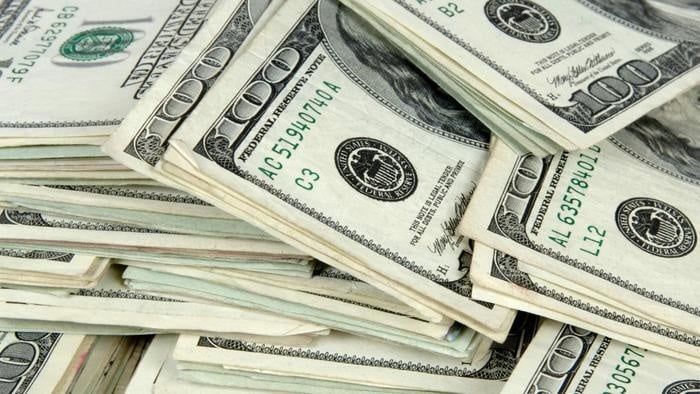
- Russians lined up at ATMs around the country to withdraw foreign currency over fears that sanctions against the country over the Ukraine invasion could cause its currency - the ruble - to collapse
- The US and the European Union this weekend agreed to kick some Russian banks off the SWIFT financial messaging system and freeze the central bank’s reserves
- Most of Europe has closed its airspace to Russian carriers, which could make it difficult to physically transport cash into the country
Russians lined up at cash machines around the country to withdraw foreign currency as new sanctions to punish the Kremlin for its invasion of Ukraine sparked fear the ruble could collapse.
The rush for foreign currency came despite some lenders selling dollars at more than a third higher than the market’s close on Friday, and well past the psychologically important level of 100 rubles per dollar that many economists said would trigger an interest-rate hike by the Bank of Russia. The shock came as Russians were still digesting news that Europe was closing its airspace to them and popular payment systems like ApplePay would stop working.
"I’ve stood in lines for an hour, but foreign currency is gone everywhere, just rubles," said Vladimir, a 28-year-old programmer who declined to give his last name, while waiting in a long line at an ATM in a Moscow shopping mall. "I got a late start because I didn’t think this was possible. I’m in shock."
The US and the European Union this weekend agreed to kick some Russian banks off the SWIFT financial messaging system and freeze the central bank’s reserves as they reacted with horror to the violence of Vladimir Putin’s attack on Ukraine. Most of Europe has closed its airspace to Russian carriers, which could make it difficult to physically transport cash into the country.
Putin is facing the harshest sanctions leveled at a major economy in at least a generation, and some of the pain may be seen when markets open Monday. As recently as Friday, some Biden administration officials privately said that they weren’t seriously considering acting against SWIFT, but momentum built to act as details of the scale of the invasion became clear.
There are indications that the ruble could fall sharply when trading opens on Monday. Exchange rates being offered by lenders are already varying widely on Sunday, from 98.08 rubles per dollar at Alfa Bank to 99.49 at Sberbank PJSC, 105 at VTB Group and 115 at Otkritie Bank at 3:30 p.m. in Moscow. The spot ruble price on the Moscow Exchange closed at 83 per dollar on Friday.
“I can’t see a scenario where it doesn’t get hammered,” said Paul McNamara, a fund manager at GAM Investments. “I don’t expect effective intervention in terms of pricing, but in terms of reducing legal grounds to sell rubles.”
The central bank said last week it was increasing supplies of cash to ATMs to meet the demand and issued another statement Sunday vowing to provide banks “uninterrupted” supplies of rubles. The release made no mention of possible foreign-currency support or the sanctions.
Russia last faced a major run on cash in 2014, when plunging oil prices in the wake of western sanctions triggered a crash in the exchange rate. Sberbank, Russia’s biggest bank, ran through 1.3 trillion rubles ($16 billion) in a single week.
Representatives of Sberbank and VTB, state lenders that have both been targeted by sanctions, did not immediately respond to requests for comment. A spokesperson for the Moscow Exchange declined to comment about plans for ruble trading on Monday.
“The situation is completely unstable, and sanctions and restrictions on the central bank can only get worse,” said Alexandra Suslina, a budget specialist at the Moscow-based Economic Expert Group.
“There’s already a bit of a rush to take money out of ATMs, but no cash machine is designed for the lines that will appear at sanctioned banks.”




 Publications
Publications
 Partners
Partners












